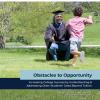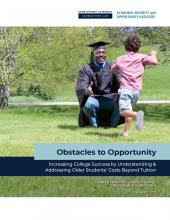0
Report
Community: Postsecondary
May 20, 2021
Higher education offers millions of people the opportunity to improve their financial well-being. However, higher education is prohibitively expensive and can saddle people with insurmountable debt. Costs beyond tuition—such as housing, food, child care, and transportation—are large, essential components of the cost of attending college for students. In order to better understand how these living costs add up and vary, this report offers estimates of costs beyond tuition for older students between the ages of 25 – 45, who make up roughly one-third of college students and face unique barriers to college access and completion. The report shows that the real cost of college for older students is higher than commonly understood, examines older students’ challenges with financial aid and public benefits programs, and offers policy recommendations to address costs beyond tuition and improve college access and success for older students.
Authored by: Vincent Palacios, Casey Goldvale, Chris Geary & Laura Tatum for GEORGETOWN LAW
Topics: Attendance, Community development, Education, Housing, Post-secondary, Stability, Workforce development
 Shared by Housing Is
Shared by Housing Is
Housing Is posted a
on May 20, 2021
Vincent Palacios, Casey Goldvale, Chris Geary & Laura Tatum for GEORGETOWN LAW
Higher education offers millions of people the opportunity to improve their financial well-being. However, higher education is prohibitively expensive and can saddle people with insurmountable debt.
0
Research
Community:
Aug 5, 2019
CLPHA developed a general data sharing template that public housing authorities (PHAs) and their health partners can customize to suit their data sharing and collaboration needs. Please feel free to comment to share any uses/modifications your organization made to implement into a partnership.
Authored by:
Topics: Affordable Care Act, CLPHA, Community development, Cost effectiveness, Data sharing, Dental, Depression, Dual-eligibles, Funding, Health, Healthy homes, Legislation & Policy, Low-income, Medicaid / Medicare, Mental health, Metrics, MTW, Nutrition, Obesity, Partnerships, Place-based, Preventative care, Racial inequalities, Research, SAMHSA, Smoke-free, Stability, Substance abuse, Supportive housing, Sustainability, TA
 Shared by Steve Lucas
Shared by Steve Lucas
Steve Lucas posted a
on Aug 5, 2019
Disclaimer: This template is provided for informational purposes only and not for the purpose of providing legal advice. You should contact your attorney to obtain advice with respect to any particular issue or question. Use of this template, including its exhibits and attachments, does not create a relationship or any responsibilities between CLPHA and the user.
CLPHA developed a general data sharing template that public housing authorities (PHAs) and their health partners can customize to suit their data sharing and collaboration needs. Please feel free to comment to share any uses/modifications your organization made to implement into a partnership.
0
Research
Community:
Aug 19, 2018
On the 50th anniversary of the Fair Housing Act, there is growing discussion and concern about gentrification. In almost every American city, long-time residents feel increasingly
anxious that they will be priced out of their homes and communities, as growing numbers of higher-income, college-educated households opt for downtown neighborhoods. Yet when looking through the lens of fair housing, gentrification also offers a glimmer of hope, as the moves that higher-income, white households make into predominantly minority,
lower-income neighborhoods are moves that help to integrate those neighborhoods, at least in the near-term. The key question is whether this integration will last and help to deliver on the promise of the Fair Housing Act to promote and further integrated living. Inverting the famous words of community organizer Saul Alinsky, this integration may only be the time between when the first white moves in and the last family of color moves out.
Authored by: Ingrid Gould Ellen and Gerard Torrats-Espinosa for NYU Furman Center
Topics: Community development, Housing, Low-income, Mobility, Racial inequalities, Research, Stability
 Shared by Mica O'Brien
Shared by Mica O'Brien
Mica O'Brien posted a
on Dec 19, 2018
Ingrid Gould Ellen and Gerard Torrats-Espinosa for NYU Furman Center
On the 50th anniversary of the Fair Housing Act, there is growing discussion and concern about gentrification.
0
Report
Community:
Nov 14, 2018
This report is intended as a practical tool for those seeking to understand how capital does and does not flow to communities, businesses, and households. This can inform efforts by community developers to identify projects in need of financing, raise capital, and design and market new financial products and services. We provide a concise how-to guide across five approaches to assessing community need, a four-step process to study capital flows, and eleven approaches to determining capital gaps. To help ground this, we provide examples drawing from original data about the Twin Cities of Minneapolis and St. Paul, Minnesota.
Authored by: Brett Theodos, Eric Hangen, Carl Hedman, and Brady Meixell for Urban Institute
Topics: Asset building, Community development, Midwest, Stability
 Shared by Mica O'Brien
Shared by Mica O'Brien
Mica O'Brien posted a
on Dec 12, 2018
Brett Theodos, Eric Hangen, Carl Hedman, and Brady Meixell for Urban Institute
This report is intended as a practical tool for those seeking to understand how capital does and does not flow to communities, businesses, and households.
0
Report
Community:
Oct 24, 2018
CLPHA’s Housing Is Initiative is engaged in a number of cross-sector activities focused on developing partnerships, facilitating a community of practice, resource development, promoting best practices, online collaboration, policy and advocacy, and training and education. Read about recent activities in this Fall Update.
Authored by:
Topics: Child welfare, CLPHA, Community development, Cost effectiveness, Data sharing, Early childhood, Education, Family engagement, Funding, Health, Homelessness, Housing, Low-income, Medicaid / Medicare, Mental health, Partnerships, Place-based, Post-secondary, Research, Stability, Substance abuse, Workforce development, Youth
 Shared by Mica O'Brien
Shared by Mica O'Brien
Mica O'Brien posted a
on Oct 24, 2018
CLPHA’s Housing Is Initiative is engaged in a number of cross-sector activities focused on developing partnerships, facilitating a community of practice, resource development, promoting best practices, online collaboration, policy and advocacy, and training and education.
0
Research
Community:
Oct 4, 2018
Housing providers and counselors in urban, suburban, and rural areas can help refugees and resettlement agencies navigate challenging rental markets, understand the evidence about how housing and neighborhoods matter, and prepare for long-term success as a renter or owner.
Authored by: Brianne Casey, Kimberly Burrowes, and Maya Brennan for Urban Institute
Topics: Community development, Housing, Immigrants, Research, Stability
 Shared by Mica O'Brien
Shared by Mica O'Brien
Mica O'Brien posted a
on Oct 4, 2018
Brianne Casey, Kimberly Burrowes, and Maya Brennan for Urban Institute
Housing providers and counselors in urban, suburban, and rural areas can help refugees and resettlement agencies navigate challenging rental markets, understand the evidence about how housing and neighborhoods matter, and prepare for long-term success as a renter or owner.
0
Report
Community:
Nov 1, 2017
Why do some neighborhoods appear able to launch effective local improvement initiatives, while others are more hampered by fragmentation and mistrust? Why can some communities mobilize diverse constituencies to influence public policy, while others cannot? Answers to these questions may be found in the specific patterns of collaboration that form among community organizations, and between these groups, schools, public agencies, and elected officials, according to MDRC, a preeminent social-policy research organization.
Authored by: MDRC
Topics: Asset building, Child welfare, Community development, Data sharing, Dual-generation, Education, Family engagement, Funding, Health, Housing, Legislation & Policy, Low-income, Metrics, Midwest, Mobility, Out-of-school time, Partnerships, Place-based, Preventative care, Research, Safety, Stability, Workforce development, Youth
 Shared by Mica O'Brien
Shared by Mica O'Brien
Mica O'Brien posted a
on Jun 29, 2018
Why do some neighborhoods appear able to launch effective local improvement initiatives, while others are more hampered by fragmentation and mistrust? Why can some communities mobilize diverse constituencies to influence public policy, while others cannot?


 Shared by Housing Is
on May 20, 2021
Shared by Housing Is
on May 20, 2021

 Shared by Steve Lucas
on Aug 5, 2019
Shared by Steve Lucas
on Aug 5, 2019

